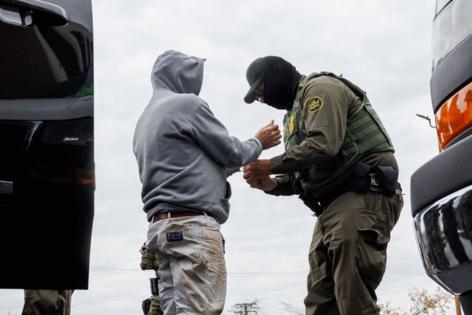Federal appeals court temporarily halts release of hundreds of Operation Midway Blitz detainees in Illinois
Published in News & Features
CHICAGO — A federal appeals court has temporarily halted the release on bond of hundreds of immigrants whose arrests during Operation Midway Blitz are being challenged under a consent decree that limits so-called warrantless arrests that occur without a prior warrant or probable cause.
U.S. District Judge Jeffrey Cummings had allowed their release on a $1,500 bond and some form of monitoring, including electronic ankle monitors, pending the outcome of immigration proceedings. Most of those arrested were originally processed at the U.S. Immigration and Customs Enforcement facility in west suburban Broadview, but have since been moved to jails around the country.
But Trump administration has asked an appeals court to block the release Friday of some 450 Chicago-area immigration arrestees, arguing the judge made a “bevy of legal errors” that put public safety at risk and “cripple” immigration enforcement.
“The district court’s orders subject the government to burdensome, costly and intrusive mandates — including training, documentation and reporting requirements — and cripple the government’s renewed implementation of the nation’s immigration laws after years of non-enforcement,” the administration argued.
Just a day before the order was set to take effect, the 7th U.S. Circuit Court of Appeals on Thursday stayed Cummings’ order pending further review. But it put the case on an extremely fast track, setting arguments for Dec. 2.
It marked the second time in two days that the 7th Circuit has ruled in favor of President Donald Trump’s administration in an immigration-related case. On Wednesday, a three-judge panel issued a stay on a preliminary injunction restricting the use of tear gas and other force by immigration agents against protesters and the media, saying it was “overbroad.”
Mark Fleming, the lead plaintiffs’ attorney in the underlying lawsuit, said Thursday he was “disappointed” in the stay “given the urgency in getting individuals released” while their cases are pending. But Flemings said the fact the court set it for argument so quickly was encouraging.
“It gives us the opportunity to explain why the court’s original order and the order for interim relief were appropriate,” said Fleming, associate director of federal litigation for the National Immigrant Justice Center.
Tricia McLaughlin, assistant secretary for the U.S. Department of Homeland Security, said in a statement: “Finally, a showing of common sense among the judiciary.”
“Lawbreakers are off American streets, and we look forward to the Trump administration’s ultimate vindication on this issue,” McLaughlin said.
The 7th Circuit’s latest order comes nearly a week after the Trump administration released the names of 614 people whose Chicago-area immigration arrests may have violated the consent decree. The list provided criminal history information for only 16 that the government argued were a “high public safety risk.” About 40 others were listed as high risk without a detailed justification.
Controversial tactics by immigration agents had led to the arrests of thousands in the Chicago area during the administration’s crackdown called Operation Midway Blitz, at times sweeping up people on the way to work, school and outside of courthouses.
In explaining his decision, Cummings read from a summary he and his law clerks compiled from more than 150 ongoing immigration petitions in federal court, where arrestees were challenging deportation. He said the circumstances of the arrests showed him that, by and large, Operation Midway Blitz was not targeting hardened criminals.
Of them, Cummings said, 54 people were arrested while at work, including 20 landscapers, four Uber or taxi drivers, and two street vendors. Another 20 were arrested while commuting to or from work, and nine were detained at a Home Depot or Menards, where they were presumably either seeking work or buying job supplies, the judge said.
Known as the Castañon Nava settlement agreement, the consent decree issued during President Joe Biden’s administration bars agents from making warrantless immigration arrests unless they have probable cause to believe someone is in the U.S. unlawfully and that the person is a flight risk.
It was originally supposed to sunset in March. Instead, after the Trump administration began ramping up immigration enforcement efforts in January, lawyers for the National Immigrant Justice Center and ACLU alleged dozens of violations, mostly involving “collateral arrests,” or the detaining of individuals who are not targets.
In his Oct. 7 order extending the consent decree until February, Cummings said ICE had improperly told its field offices over the summer that the consent decree had been canceled. He also called into question the recent immigration raid on an apartment building in South Shore, where agents in military gear burst through doors and zip-tied residents regardless of citizenship.
And the judge also took particular issue with a practice by ICE agents of carrying blank I-200 warrant forms with them on missions and filling them out at the scene.
____
©2025 Chicago Tribune. Visit at chicagotribune.com. Distributed by Tribune Content Agency, LLC.







Comments